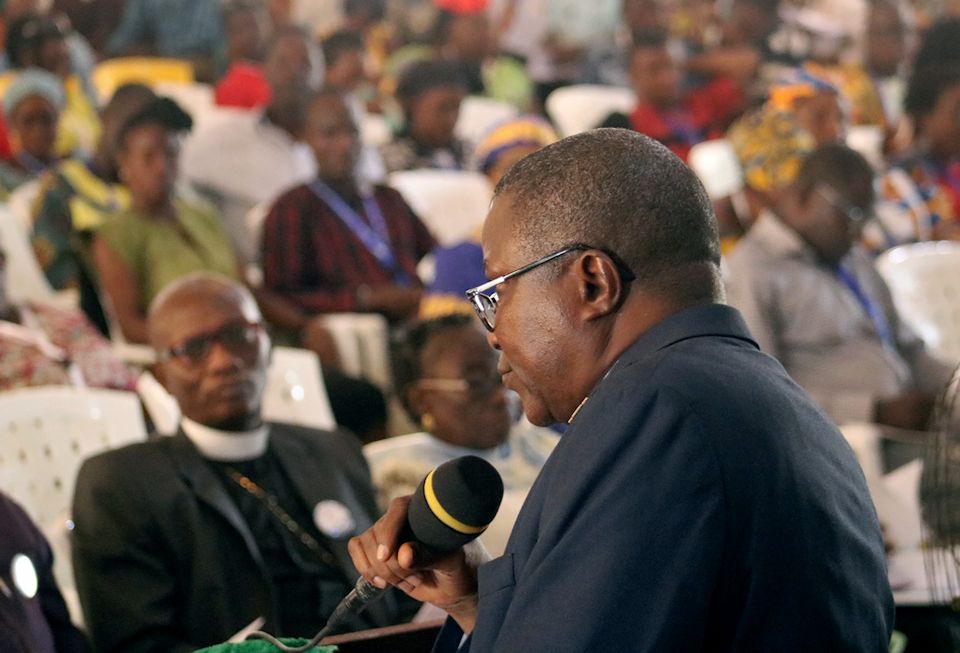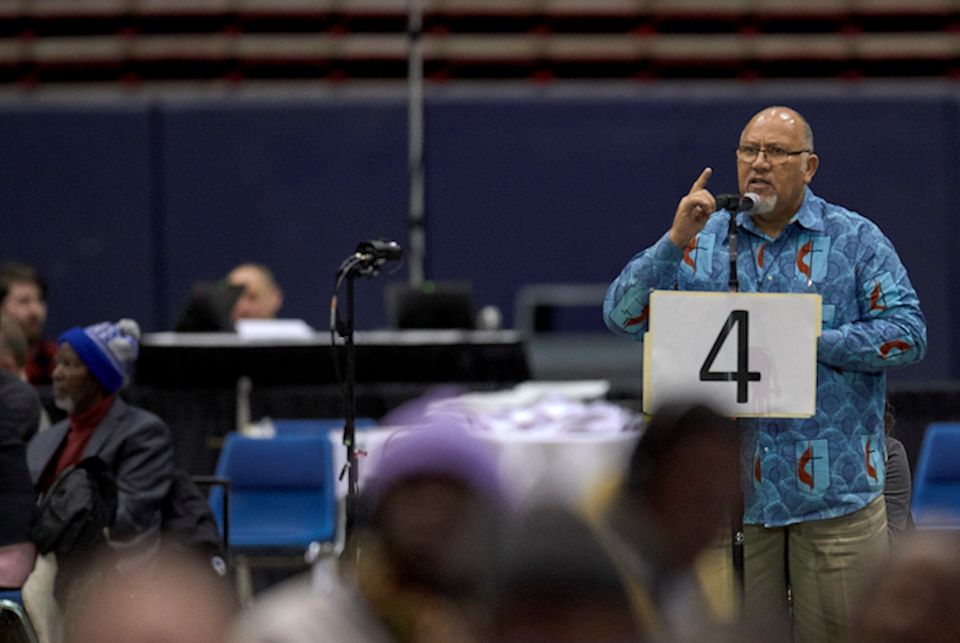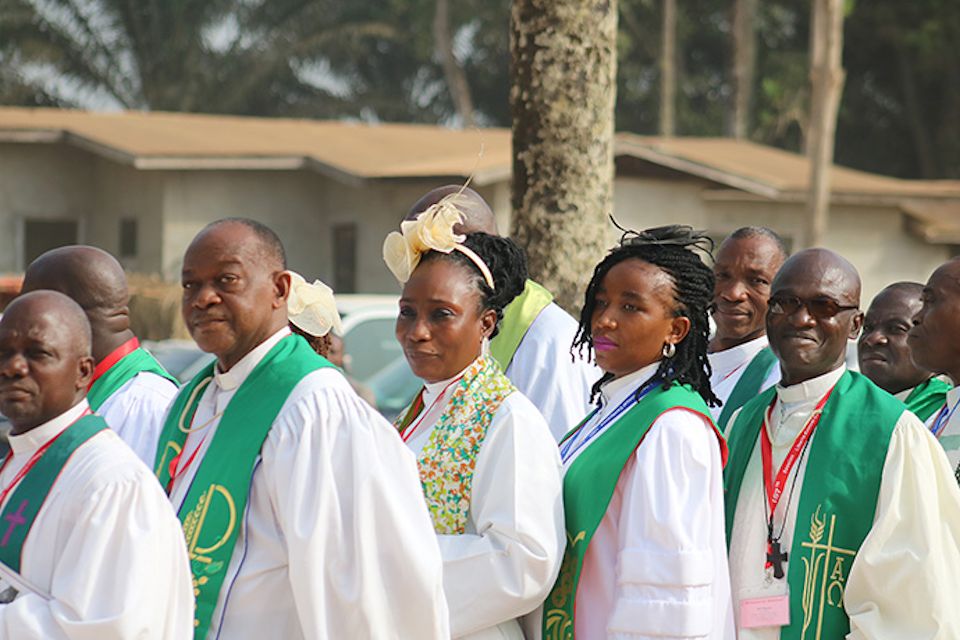Liberia’s General Conference delegates are mandated to work for changes in the financial aspects of the Protocol and lower the percentage of votes needed for a conference to leave The UMC.
E. JULU SWEN | SAM HODGES
UM News
Liberian United Methodists say they won’t support a proposed separation plan for The United Methodist Church without major amendments, and they call on other African members to join in pushing for those changes at the 2020 General Conference.
A resolution approved Feb. 14 by the denomination’s Liberia Conference at its regular annual meeting in Ganta also expresses unhappiness over having no direct input in the development of the Protocol of Reconciliation & Grace Through Separation.
“We resolve that all central conferences be treated as equal members of our global connection and left to decide of their own volition their future association and destiny,” the resolution says. Central conferences are regional units of the denomination in Africa, Europe and the Philippines. General Conference is The United Methodist Church’s top lawmaking assembly, which meets every four years.
A 16-member team, representing traditionalist, progressive and centrist parts of the denomination, negotiated the protocol to try to end longstanding, intensifying conflict in the denomination over how accepting to be of homosexuality. Famed mediator Kenneth Feinberg oversaw the talks.
Under the protocol, traditionalist churches could leave with their properties and form their own denomination, getting $25 million in United Methodist funds. Another $2 million would be set aside for other church groups that might decide to leave.
The protocol has picked up endorsements from a range of advocacy groups. The Philippines Conference Cavite last week backed the plan and became the first conference to send the accompanying legislation for placement on the agenda of the 2020 General Conference, set for May 5-15 in Minneapolis.
The Liberia Conference resolution — approved 725-0, with one abstention — supports the need for an “arranged separation” given the degree of conflict over homosexuality.
But the resolution requires Liberia’s General Conference delegates to work with other Africans to amend the financial aspects of the plan and lower the percentage of votes needed for a conference to decide to leave The United Methodist Church.
“The protocol as it stands has lots of faults, with a colonial underpinning,” said the Rev. Jerry Kulah, who leads the Liberia Conference delegation.
The resolution was approved during the 187th annual session of the conference Feb. 10-16. Conference members conducted other business and heard the episcopal address from Bishop Samuel J. Quire Jr.
The resolution begins by laying out “core values” of the conference, including that marriage is defined by the Bible and Christian tradition as between a man and a woman, and that self-avowed practicing homosexuals should not be eligible for ordination as clergy.
Those are official positions of The United Methodist Church. Centrists and progressives have committed to removing them, along with the church’s statement that the practice of homosexuality is incompatible with Christian teaching.

The Liberia resolution calls for removing language from the protocol that conferences would remain in The United Methodist Church unless they vote to leave.
The resolution says that “any attempt to align or subjugate all central conferences and their annual conferences to a post-separation UMC by default, as the protocol proposes, would be viewed as an act of colonialism and injustice against the central conferences.”
While the protocol calls for conferences to have at least a 57 percent vote to leave The United Methodist Church, the resolution says that a simple majority should be the margin by which conferences or churches decide their denominational affiliation.
Instead of a departing traditionalist group getting $25 million, the resolution calls for $120 million in United Methodist assets to be divided equally among the U.S. jurisdictions and the central conferences, which are in Africa, Europe and the Philippines.
The protocol doesn’t identify the source of the $25 million. Church financial experts agreed that unrestricted liquid assets of the general church totaled about $120 million.
The resolution also asserts the right of the Liberia Conference and the African central conferences to retain the name “United Methodist Church” and the use of the cross-and-flame logo with “appropriate modifications,” though those are not spelled out.
Bishop John Yambasu of the Sierra Leone Conference last summer organized talks involving other central conference bishops, and those talks led to formation of the team that drafted the protocol. Yambasu was the sole African on the protocol team, though there were representatives from the Philippines and Europe.
The Rev. Keith Boyette, also on the team, said the Liberians’ concerns as reflected in the resolution were shared by himself and other traditionalists at the table.
“The only way the participants in the mediated negotiation could achieve a unanimous agreement was to resolve those issues in the way they are addressed in the protocol,” said Boyette, president of the traditionalist Wesleyan Covenant Association. “Had we persisted in holding to the positions expressed in the resolution, unanimity would not have been achieved and a protocol would not have been signed.”
Boyette and the other team members agreed to support the protocol alone, and in its negotiated form, instead of other plans for the future of the church that will be considered at the 2020 General Conference.
Boyette and other U.S. traditionalist leaders, as well as many centrists and some progressives, have argued that the protocol must be approved as is.
Efforts to amend it would be understandable but a gamble, said the Rev. Thomas Lambrecht, vice president of the traditionalist advocacy group Good News.
“Is it better for the delegates to push for greater fairness in the protocol at the risk of passing no plan of separation? Or is better to end our church’s conflict through separation for the sake of mission, even if means accepting a less desirable agreement? Only time will tell what the delegates decide,” Lambrecht said.

Good News and the WCA are part of a coalition of traditionalist United Methodist groups that provide funding for meetings of the Africa Initiative. That group of African United Methodists, coordinated by Kulah, meets before General Conference for worship and briefings on legislation and strategy.
The Rev. Forbes Matonga is a West Zimbabwe Conference delegate and part of the Africa Initiative. He echoed many of the Liberians’ concerns in a recent essay.
“Africans will not support passage of the protocol in its current form,” he wrote. “Serious amendments are needed to make it acceptable to many Africans.”
Boyette and Lambrecht said discussions have been underway and will continue with African United Methodists and others.
“We hope to arrive at a unified strategy with the Africa Initiative and delegates from Europe and the Philippines in approaching the protocol,” Lambrecht said. “We will do a lot of listening and problem-solving together.”
The denomination will hear soon from other African United Methodists.
Yambasu said recently that the Sierra Leone Conference will consider affirming the protocol and sending it on to General Conference during an early March session.
Bishop Quire, who presided at the recent Liberia Conference meeting, assured delegates “you have the right to vote or not to vote” on the resolution.
He noted that the resolution did not come from him but from conference members.
“I am not a member of our conference but a United Methodist bishop assigned to the Liberia Episcopal Area,” he told delegates.
The resolution says Liberian General Conference delegates are “mandated” to work for amendments to the protocol.
Boyette is a former member of the Judicial Council, the denomination’s high court. He said the court’s rulings have made clear that delegates get to vote according to their conscience.
“An annual conference can certainly adopt a resolution expressing the sense of the annual conference which delegates might refer to in deciding how they might choose to vote,” he said.
Last Updated on September 20, 2022

